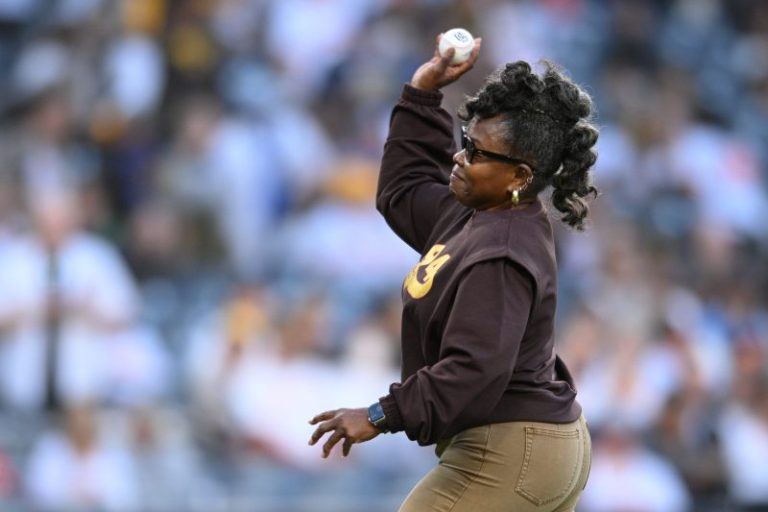Tony Gwynn leaned over to his wife, Alicia, from his hospital bed, and whispered in her ear.
“Don’t let the people forget about me,’ Gwynn told Alicia, his wife of 33 years.
Alicia, who had known Tony since they were grade school classmates, promised she would forever protect his legacy.
‘That really dug into my heart,’ Alicia Gwynn told USA TODAY Sports, “with Tony saying, ‘Don’t let the people forget about me.’ He’d say, ‘I need you to finish the work, keep the family together.’
“I don’t think Tony let go until he knew I’d be fine.’’
Tony Gwynn, the San Diego Padres’ eight-time batting champion and Hall of Famer, died two days later on June 16, 2014. He was 54.
Gwynn was one of the greatest pure hitters in baseball history, with a .338 career batting average. And he was an even better person.
He was everyone’s favorite, from the writers, to the groundskeepers, to the batboys, to the fans.
If you knew Gwynn, you loved him.
Alicia, with two children and seven grandchildren, wanted to honor her husband the best she could, while also taking care of her family.
She and the family decided to sell virtually all of Gwynn’s memorabilia, from his Gold Glove awards to his Silver Sluggers, to his All-Star rings, to personalized bats and autographed baseballs. Only Gwynn’s Roberto Clemente Award, Hall of Fame ring and batting champion rings will remain in the family.
In all, according to Scott Keeney, founder and CEO of Realest, a sports and entertainment memorabilia authentication company, the memorabilia (via The Tony Gwynn Memorabilia Auction) could generate in excess of $1 million.
“I was always so proud of the awards, especially each Gold Glove,’’ Alicia said, “but Tony didn’t care about keeping them. He was like, ‘I know what I did. I carry my awards with my heart, I know what I did. I don’t need to see them in a glass case, I know what I did.’’’
Alicia, who moved to a smaller home after Tony’s death, needed five large storage rooms at facilities just to preserve all of the memorabilia. She realized that at some point, they needed to go.
“I’d literally go to a place to see the stuff,’’ Alicia said, “and get overwhelmed. I knew it was mentally time for me to move on and let go.’’
So she contacted Realest, had all of the memorabilia loaded into a huge 26-foot truck, and began auctioning items, using the money to help support the family and assuring that all of the grandkids will be taken care of through their young adult lives.
“The memories will always stay with me,’’ Alicia said. “I feel like I was part of the Gold Gloves and batting titles. I was on the Bazooka bucket, eight months pregnant, throwing to him and putting balls on a tee for him. I remember when people said he couldn’t play defense and he worked so hard on that. He was so proud to get those Gold Gloves.
“Those things all brought good memories, but it was more stressful hanging onto all of that stuff. I feel good about fans wanting to still buy things, letting us know how much they think of him.’’
Oh, they remember, all right. There’s a reason why Gwynn’s 1991 Gold Glove award brought in a record $62,500 alone, with his 1994 Silver Slugger selling for $52,000. They are getting bids not only from folks in San Diego, but throughout the world, Keeney says.
“When we went into this together, it was, ‘How do we keep the legacy of Tony alive?’ ‘ Keeney says. “How the history is told through these artifacts, and not just in San Diego, but across the globe.
“The Gwynn family already lived it, they don’t need the awards any longer, and are letting the fans experience it, showing how beloved Tony was to everyone.’’
The family knew the impact Gwynn had in the San Diego community, but perhaps underestimated what the rest of the world thought of him,
“I feel good about it,’’ Alicia said. “I feel good about fans wanting to still buy that stuff. It lets me know people don’t forget, but fans tell me all of the time, ‘I’ll never forget him. Not just for the player he was, but the person he was.’
“Even before he died, Tony told me, ‘I don’t want to be remembered as a good baseball player, I want to be remembered as a good father, a good husband, a good confidant, a good friend. I did things the right way.’
“I think Tony would be proud seeing what we’re doing.’’

